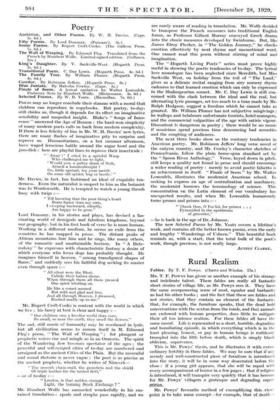Poetry
Fifty Poems. By Lord Dunsany. (Putnam's. 5s.)
POETS may no longer conclude their stanzas with a moral that children can reproduce in copybooks. But poetry, to-days still chides us, though it depends for its effect on imaginative sensibility and unspoiled insight. Blake's " Songs of Inno- cence " answered the Age of Reason : the hard-won simplicity of many modern poets calls us back from modern complexity. If there is less felicity of line in Mr. W. IL Davies' new lyrics, there are many flashes of imaginative pity to surprise and reprove us. Humanitarians, on a hot summer afternoon, have waged ferocious battle around the sugar bowl and the jam-dish : here are playful lines to reprove their insecticide : " Away ! ' I cried to a spiteful Wasp Who challenged me to fight,
' Would you, a paltry dram of flesh, Attack a hundredweight ?
Go, little upstart, try your mettle On some old spider, bug or beetle.' "
Mr. Davies, in fact, has fashioned an ideal of exquisite ten- derness. Even the naturalist is suspect to him as the botanist was to Wordsworth. He is tempted to watch a young thrush busy with twigs :—
" Till knowing that the poor thing's heart
Beats faster than my own, I creeping backward, silently, Am happy to be gone."
Lord Dunsany, in his stories and plays, has devised a fas- cinating world of demigods and fabulous kingdoms, beyond our geography, but in his first book of verse he is more human. Working in a different medium, he seems an exile from the countries he has mapped in prose. The distant peaks of African mountains lure him and he sings, like many others, of the romantic and unattainable horizon. In " A Hete- rodoxy " he expresses with characteristic fantasy a desire of which everyone who loves dogs has probably thought. He imagines himself in heaven, " among transfigured shapes of flame," and suddenly sees his faithful dog seeking its master even through space :-
" All silent were the. Blest, Calmly their haloes shone,
When through them all there pressed One spirit whirling on.
He like a comet seemed But wild and glad and free, And all through Heaven, I dreamed, Rushed madly up to me."
Mr. Rupert Croft-Cooke is content with the world in which we live ; his fancy at best is clear and happy :-
" Our children own a lovelier world than ours,
So small, so near the earth, they smell the flowers."
The sad, still music of humanity may be overheard in lyric, but all civilization seems to mourn itself in M. Edmund Fleg's poem, " The Wall of Weeping " ; for plangent or prophetic voices rise and mingle as in an Oratorio. The spirit of the Wandering Jew becomes spectator of the ages ; the powerful and self-centred cities of to-day are numbered and arraigned as the ancient Cities of the Plain. But the mournful and moral rhetoric is never vague : the poet is as precise as the ancient prophets, whether he writes of Nineveh-
" The smooth chain-mail, the gauntlets and the shield Of triple leather for tho tented field," —or of to-day :— 0 London, is that sudden strange
Light, the burning . Stock Exchange !!
Mr. Humbert Wolfe has succeeded wonderfully in his sus- tained translation : epode and strophe pass rapidly, and We are rarely aware of reading in translation. Mr. Wolfe decided to transpose the French measures into traditional English forms, as Professor Gilbert Murray conveyed Greek drama into the choric measures developed by Swinburne. But, like James Elroy Meeker, in " The Golden Journey," he checks emotion effectively by neat rhyme and unemotional word. One cannot read this poem without stirring of mind and imagination.
The " Hogarth Living Poets " series must prove highly useful in showing the poetic tendencies of to.:daY. The lyrical love monologue has been neglected since Meredith, but Miss Sackville West, on holiday from the toil of " The Land," gives us a delicate recital ranging from airy nursery rhyme cadences to that learned emotion which can only be expressed in the Shakespearian sonnet. Mr. C. Day Lewis is still con- cerned with the clash between the ideal and the real, but alternating lyric passages-, set too much to a tune made by Mr. Ralph Hodgson, suggest a freedom which he cannot take as granted. Mr. William Plomer has not subjective misgivings ; he wallops and belabours unfortunate tourists, hotel managers, and the commercial vulgarities of the age with 'satiric vigoui. Discontent is dangerous in poetry ; there would be no music if musicians spend precious time denouncing bad acoustics and the coughing of audiences.
The next three books show us the contrary tendencies in American poetry. Mr. Robinson Jeffers' long verse novel of the canyon country, and Mr. Cowley's character sketches of Pennsylvania, follow the plain home-spun standard set by the " Spoon River Anthology." Verse, keyed down in pitch, still keeps a quality not found in prose and should encourage a wider reading of poetry : merely to avoid poetic falsetto is an achievement in itself. " Finale of Seem " by Mr. Walter Lowenfels, illustrates the modernist American school. In seeking to express an age of centralization and machinery, the modernist borrows the terminology of science. This concentration on the Latin element of our vocabulary has unexpected results, and when Mr. Lowenfels humorously- turns prunes and prisms into
Thank thee, 0 Euclid, for prisms ; Pyramided in the apotheosis of groceries,"
—he is back in the age of Dr. Johnson.
The new Selected Poems by Mr. Yeats' covers a lifetime's work, and contains all the better known poems, even the early and lengthy " Wanderings of Usheen." This beautiful book reminds us, with a start, that the total bulk of the poet's work, though precious, is not really large.
Ausrnsf CLARE.
































 Previous page
Previous page